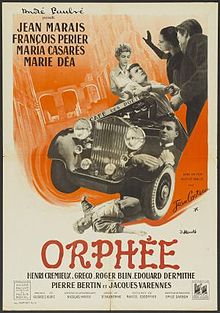- Orpheus (film)
-
Orpheus 
Directed by Jean Cocteau Produced by André Paulvé Written by Jean Cocteau Starring Jean Marais
François Périer
María Casares
Marie DéaMusic by Georges Auric Cinematography Nicolas Hayer Editing by Jacqueline Sadoul Distributed by DisCina Release date(s) 29 September 1950 (France)
November 29, 1950 (US)Running time 95 min Country France Language French Orpheus (French: Orphée) is a 1950 French film directed by Jean Cocteau and starring Jean Marais. This film is the central part of Cocteau's Orphic Trilogy, which consists of The Blood of a Poet (1930), Orpheus (1950) and Testament of Orpheus (1960). The trilogy has been released as a DVD boxed set by The Criterion Collection.
Contents
Plot
Set in contemporary Paris, the movie is a variation of the classic Greek myth of Orpheus. At the Café des Poètes, a brawl is staged by acolytes of the Princess (Casares) and the young poet Cègeste (Edouard Dermithe), a rival of Orpheus, is killed. Cègeste's body is taken to the Princess's car by her associates, and Orpheus (Marais) is asked to accompany them as a witness. They drive to a chateau (the landscape through the car windows are presented in negative) accompanied by abstract poetry on the radio. This takes the form of seemingly meaningless messages, like those broadcast to the French Resistance from London during the Occupation.
Orpheus becomes obsessed with Death (the Princess). Heurtebise (Périer), her chauffeur, entertains analogous unrequited love for Orpheus's wife Eurydice (Marie Déa). They fall in love. Eurydice is killed by the Princess's henchmen and Orpheus goes after her into the Underworld. Although they have become dangerously entangled, the Princess sends Orpheus back out of the Underworld, to carry on his life with Eurydice, but he cannot look at her or she will die. (This diverges from the common classical account found in the Roman versions of the myth by Ovid and Virgil, where Eurydice is lost forever.) They believe it to have been a dream, Eurydice is revealed to be alive, and expecting a child.
Main cast
- Jean Marais – Orphée
- François Périer – Heurtebise
- María Casares – The Princess – Death
- Marie Déa – Eurydice
- Henri Crémieux – L'éditeur
- Juliette Gréco – Aglaonice
- Roger Blin – The Poet
- Edouard Dermithe – Jacques Cégeste
- René Worms – Judge
Themes
Throughout Orpheus, Cocteau uses very simple special effects and trick shots to show his characters passing into the world of death and back to life: They do so by stepping through mirrors, or else the film is reversed.
Cocteau adds many elements from the culture of his time. For example, the messengers of the Princess of Death are grim, leather-clad motorcyclists. The underworld is represented by buildings in France which remained in ruins after World War II, and Orpheus's trial in the underworld is presented in the manner of an inquest held by officials of the German occupation attempting to discover members of the French resistance. At the very end of the film, the Princess and Heurtebise are prisoners, brought forward to face the tribunal, ominously elevated on a pedestal above them.
Most notably, the element of the myth in which Orpheus looks back at Eurydice as she is being led out of the underworld, exactly what he was told not to do and which causes him to lose her, is represented by Orpheus happening to glance at Eurydice in the rear-view mirror of a car.
References
External links
- Orpheus at the Internet Movie Database
- Orpheus at Rotten Tomatoes
- Orpheus at AllRovi
- Criterion Collection essay by Jean Cocteau
Films directed by Jean Cocteau Orphic Trilogy The Blood of a Poet · Orpheus · Testament of Orpheus
Other films Categories:- 1950 films
- French films
- Films set in Paris
- Black-and-white films
- Films based on Greco-Roman mythology
- Films directed by Jean Cocteau
- French-language films
- Romantic drama films
- Romantic fantasy films
- Surrealist films
Wikimedia Foundation. 2010.
